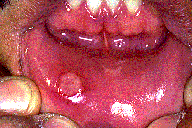Gingivitis

Gingivitis is the most common gum disease in society today. It is usually a painless condition that progresses slowly; therefore many people are unaware that they have it. It is caused by a build up of plaque or old specks of food impacted in or around the gum line. Other than causing bad breath, if left untreated, it can progress to a disease called periodontitis. Periodontitis can cause serious damage to gums, which can lead to tooth loss.
What is it?
Basically gingivitis begins with inflammation of the gums, which can be so slight it is unnoticeable. Inflammation can be localised to a small area of the gum around one or more teeth.
Symptoms
· Bad breath
· Bleeding when brushing teeth and sometimes when eating
· Swelling to areas of the gum line
· Gums affected may have a reddish tinge
As the disease progresses swelling and redness become more pronounced.
How can it be prevented and/or treated?
· Brush your teeth twice a day (or after meals)
· Use a soft bristle toothbrush, they are just as effective as a hard bristle brush, yet do less damage to the gums
· Brush your gums gently
· Use mouth wash specially used for prevention of gingivitis
· Flossing (gently) and regularly
· Removal of plaque. This can only be done by a dentist or dental hygienist, and is a process called scaling
· Change your tooth brush every 3 months
What happens if gingivitis goes untreated?
If the inflammation is not treated, gingivitis can worsen, and result in the disease periodontitis. Periodontitis occurs when the gums are damaged so much that the gum socket is affected, destroying the gum and bone. This can cause the tooth / teeth to loosen. Eventually the tooth will feel loose when chewing. In its final stage if the symptoms are ignored, an abscess can form, which is extremely painful, and the tooth may be lost.
It shouldn't be too difficult in maintaining healthy gums and teeth throughout life. With regular brushing, flossing, and mouthwashes, along with regular trips to the dentist (every six months is recommended), you should have no problems with the health of your teeth and gums. The most important thing to remember, is if you noticed any changes in the health of your gums or teeth, visit your dentist or dental hygienist. Prevention is the best way to avoid gum disease and costly treatments. Remember we only get one set of adult teeth.
- Louise Ganey
What is it?
Basically gingivitis begins with inflammation of the gums, which can be so slight it is unnoticeable. Inflammation can be localised to a small area of the gum around one or more teeth.
Symptoms
· Bad breath
· Bleeding when brushing teeth and sometimes when eating
· Swelling to areas of the gum line
· Gums affected may have a reddish tinge
As the disease progresses swelling and redness become more pronounced.
How can it be prevented and/or treated?
· Brush your teeth twice a day (or after meals)
· Use a soft bristle toothbrush, they are just as effective as a hard bristle brush, yet do less damage to the gums
· Brush your gums gently
· Use mouth wash specially used for prevention of gingivitis
· Flossing (gently) and regularly
· Removal of plaque. This can only be done by a dentist or dental hygienist, and is a process called scaling
· Change your tooth brush every 3 months
What happens if gingivitis goes untreated?
If the inflammation is not treated, gingivitis can worsen, and result in the disease periodontitis. Periodontitis occurs when the gums are damaged so much that the gum socket is affected, destroying the gum and bone. This can cause the tooth / teeth to loosen. Eventually the tooth will feel loose when chewing. In its final stage if the symptoms are ignored, an abscess can form, which is extremely painful, and the tooth may be lost.
It shouldn't be too difficult in maintaining healthy gums and teeth throughout life. With regular brushing, flossing, and mouthwashes, along with regular trips to the dentist (every six months is recommended), you should have no problems with the health of your teeth and gums. The most important thing to remember, is if you noticed any changes in the health of your gums or teeth, visit your dentist or dental hygienist. Prevention is the best way to avoid gum disease and costly treatments. Remember we only get one set of adult teeth.
- Louise Ganey
MORE
- How to Conquer Bad Winter Health Habits
- Resident Evil: What Lies Outside'
- 1.5 million for 1.5 million Victorians...
- Be U Not a Bully Forum for Parents and Teens
- New Screening Test Recommended To Help Prevent...
- Vitamin D Mushrooms May Solve Health Dilemma
- Gemma Howorth World-First Solates Class Interview
- Federal Government Clarifies Carer Allowance...
- Fiona Clark Sleep Problems Linked to Bullying...
- Elective Surgery and Emergency Care on Increase
- Emotional Stress Proves to be a Pain in the Back
- CPSA applauds Choice IPL and Laser Regulation...
- Karen Kaye Complementary Medicines Are...
- Danielle Stowasser Pain Relief Interview
- Dr Weng Sam Type 2 Diabetes Medication Interview
- Blood Clots and Stroke Fourth Indicator
- An Unhealthy Mouth can lead to Heart Disease
- Sharing MS Diagnosis Key To Retaining Employment
- CanTeen Counselling Service
- Australia Leads The Way With HPV Vaccination Of...
- Chloe Cunningham No More Angels Lost to...





